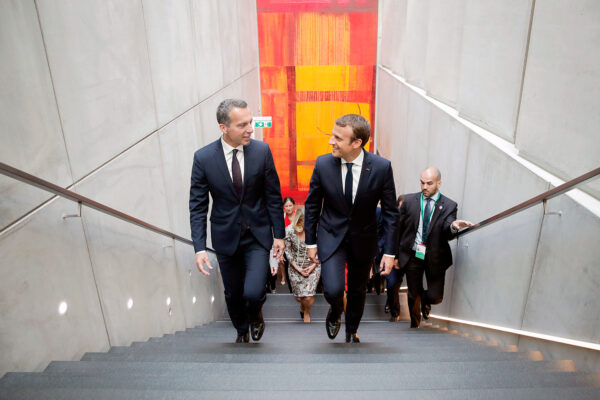
Commentators outside France have been predicting Emmanuel Macron’s downfall from the beginning of his presidency.
My own view throughout has been that unpopularity is unlikely to keep Macron up at night. He has been reforming France so thoroughly and at such a fast pace that he was bound to make enemies everywhere. He has a long-enough mandate (five years) to see his reforms bear fruit. And because both the center-left and center-right are in disarray, there is no strong opposition against him.
That threatened to change this winter, when opponents of a fuel-tax increase donned fluorescent yellow vests and took to the streets. Suddenly reactionary France had a movement. Polls showed massive support. Macron hastily canceled the tax hike, the first time he had bowed to public pressure. His political obituaries were being rewritten again.
Comeback
Three months later, Macron has since regained the initiative. At thousands of “Grand Debates” across the country, voters are venting their frustrations democratically and in person rather than in the streets and online. Macron has attended only a few in person, but his frank and hours-long discussions with voters have dazzled the French media. Arthur Goldhammer reports that the coverage is reminiscent of the favorable, not to say adoring, coverage Macron received during his 2017 election campaign.
The Yellow Vests have been unmasked as the usual populist suspects: angry white men from the provinces who are all too willing to believe (sometimes Russian-funded, oftentimes antisemitic) conspiracy theories they read on Facebook. Popular support has fallen. The protests themselves have shrunk. Macron’s approval rating has climbed up from a 20-percent low in December to 27-39 percent this month. The French economy is projected to expand 1.3 percent this year and 1.5 percent in 2020. Unemployment is at its lowest in a decade.
Policy response
Goldhammer is still worried. For all the show, there has been no clear policy response to the issues raised by the Yellow Vests.
Macron is temporizing and improvising, with remarkable skill to be sure, but at some point he will have to act, and one has the sense that the smoldering anger in the country has not subsided, even if for the moment the media are distracted by le spectacle Macron.
I don’t think this is entirely right. Macron has liberalized labor laws to make it easier for companies to hire and reined in labor migration from Eastern Europe to protect low-skilled workers in France. He has allowed bus services to compete with rail to make intercity transport cheaper. He is shaking up the state-owned railway company, which has for years underinvested in commuter routes. All this should help the left behind. But none of it is the sort of big push that might convince forgotten France it is forgotten no longer.
Then again, the French who joined the Yellow Vests are unlikely to change their minds about Macron. You couldn’t find a better representative of faraway Paris, and its liberal attitudes, than the ENA-educated former Rothschild banker. Some of that anger will continue to smolder, and it will probably be felt by whoever succeeds Macron too.
